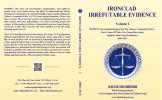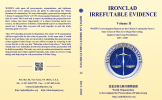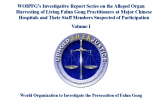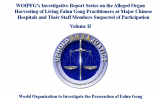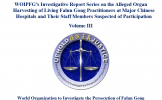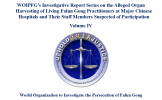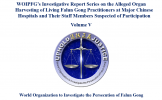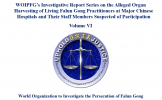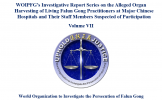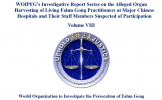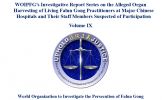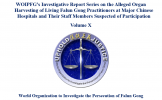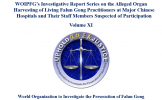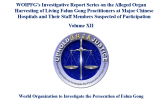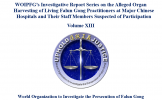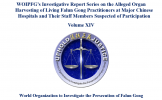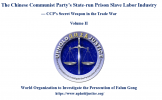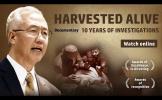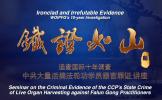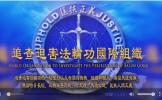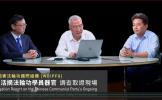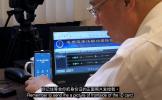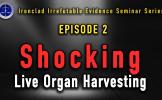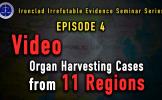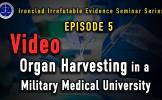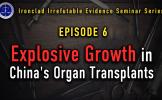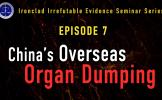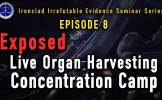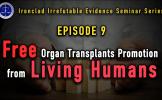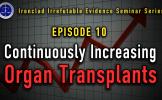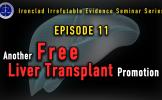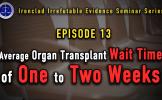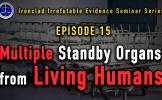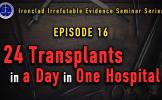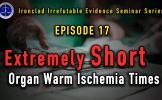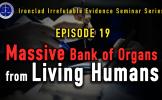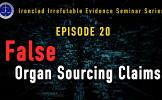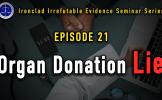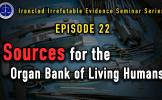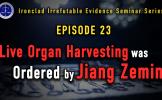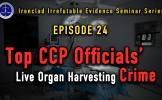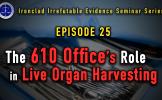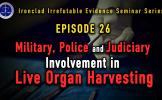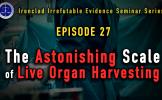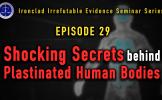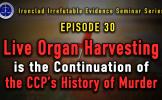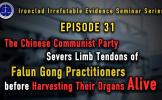WOIPFG’s Investigative Report on the Alleged Organ Harvesting of Living Falun Gong Practitioners at Peking University People’s Hospital and Its Staff Members Suspected of Participation
Address: Xizhimen campus: No. 11, Xizhimen South Street, Xicheng District, Beijing
White Dagoba Temple campus: No. 133, Fuchengmen Inner Street, Xicheng District, Beijing
Organ harvesting from Falun Gong practitioners in March 2006, WOIPFG investigated for more than ten years and collected a lot of evidence, including phone recordings and the CCP’s official numbers and documents regarding organ transplants. It shows the CCP has made huge profit from Falun Gong practitioners since 2000. The units involved are all over the provinces, municipalities and autonomous regions of mainland China, which involved the organ transplant institutes of all hospitals of military and armed police forces as well as the local hospitals (medical centers). There are even quite a few small and medium hospitals and specialized hospitals without qualified transplant techniques are also involved. [1]
Here is part of the WOIPFG investigative report of Peking University People’s Hospital and the responsible people on alleged live organ harvesting from Falun Gong practitioners
Ⅰ. Hospital Profile
Peking University People’s Hospital was established in 1918. It is currently a comprehensive tertiary A hospital with medical, teaching and scientific research capabilities. It is an affiliated hospital and second clinical medical school of Peking University under the National Health Commission, PRC’s supervision. [2] Its Organ Transplant Center was launched in October 2001 and was then renamed as Peking University Organ Transplantation Institute.
Ⅱ. Profile of Organ Transplant Center
Peking University Organ Transplant Center (“the Center”) was transformed to Peking University Organ Transplantation Institute (“the Institute”). It was established upon the personal instruction of Han Qide, then Vice Chairman of the Standing Committee of National People's Congress of the PRC, in October 2001. It was composed with five medical institutions under Peking University including Peking University First Hospital, People’s Hospital and Peking University Third Hospital. [3]
Under the direct management of Peking University Health Science Center and the collaborative efforts of such five medical institutes, a lot of work has been done on the clinical treatment and basic research of organ transplant with significant breakthroughs and progress year by year. The Center has become one of the most influential organ transplant centers and leads in many aspects in China. [4]
For the medical practice and research of liver, kidney, pancreas, heart, corneal and bone marrow transplant, The Center got several national and provincial grants, including the Special Fund for Scientific Research in the Public Interest by Ministry of Health of the PRC, 973 fund, grant of National Natural Science Foundation, and Specialized Research Fund for the Doctoral Program of Higher Education by Ministry of Education of the PRC etc. The grants totaled over 20 millions in 2013. [5]
Ⅲ. Enormous liver and kidney transplants with 4000 cases in one year
In Sep. 2013, Zhu Jiye[6], the head of Peking University Organ Transplantation Research Institute and the director of the Hepatobiliary Surgery Program at Peking University People’s Hospital, said in an interview with China Economic Weekly, “Before the pilot project in 2010, the organs from executed prisoners accounted for almost all donor sources in China. Our hospital used to perform 4,000 liver and kidney transplants within one year, and the sources of these organs were all death-row prisoners.”[7]

Figure 1 September 2013, “Xinhua Network” article snapshot
The CCP cracked down Falun Gong from July 1999. Since then to 2007, China organ transplant market grew rapidly. Especially in 2003, the organ transplants doubled. It ignited the fever of organ transplant travel to China from 2003 to 2006 all over the world. The wait time in some Chinese hospital was as short as one to two weeks while it would take two to three years overseas. Where were these organs from? Were the so called death-row inmates enough to support the rapid growing demand? [8]
According to Amnesty International, the average number of executed prisoners between 2000 and 2005 was 1600 per year while this hospital got 4000 cases of liver and kidney transplants in one year. [9] Per Ye Qifa, there were up to over 1000 hospitals that could perform organ transplant in 2007[10]. The number of executed death-row-inmates was far from such operation. That indicates there are other donor sources. The Falun Gong practitioners who can’t get any law protection could be one of such major sources.
Ⅳ. Transplant data shrunk severely on hospital official website
The hospital claimed on its official website on July 16, 2014 that it became one of the first tertiary level-A hospitals designated by the Ministry of Health to perform kidney transplants in 2007, and that it performed 80 to 90 transplants every year.[11] Since the hospital started performing liver transplants in 2000, it has performed more than 600 cases of liver transplants,[12] with an average of 40 liver transplants per year. Therefore, this shows that the hospital’s actual annual number of organ transplants is 30.70-33.30 times of the annual number publicly stated.

Figure 2 Peking University People's Hospital Cached
Ⅴ. Strong team of liver and kidney transplant physicians shows actual enormous operations
WOIPFG published the organ transplant physician list of the hospital. There were up to 31 liver and kidney transplant experts[13], who can constitute several liver and kidney transplant teams.
VI. List of Responsible People
BJRM001 Wang Xiaofeng, male, DOB: 1951, Place of Birth: Heilongjiang[14]
Personal Profile: Director of Urologic Surgery Program; Professor; Chief Physician; Commissioner, Beijing Organ Transplant sub-association, Chinese Medical Association (CMA);
Engaged in clinical, teaching and scientific research of urologic surgery since 1980; visiting scholar in Universität Gesamthochschule Essen, German, July 1989 to July 1991 to engage in scientific research and clinical work of urologic surgery; developed allogeneic kidney transplant and living donor kidney transplant in this period. [15]
BJRM002 Ye Haiyun, male
Personal Profile: Master of Medicine, Beijing Medical University, 1997; Stayed at the school to work in Urologic Surgery Program at Peking University People’s Hospital after graduation; took the positions as resident physician and attending physician; PhD of Medicine, Peking University in 2003; promoted to associate chief physician in 2006.
Studied basic and clinical Oncology of Urologic Surgery at Leopold-Franzens-Universität Innsbruck, Austria in 2005; Specialized in kidney transplant. [16]
BJRM003 Qu Xingke, male
Personal Profile: Chief Physician of Urologic Surgery
Graduated from Department of Medicine, Shandong University in 1985; engaged in clinical work of Urologic Surgery at Peking University People’s Hospital since 1985; took the positions as resident physician, chief resident, attending physician, associate chief physician, and chief physician.
Attended the European Dialysis Association (ERA-EDTA) Congress in October 2003 and American Transplant Congress in May 2005;
Dispatched to Beijing Friendship Hospital in 1991 and focused on kidney transplant; Operated the first kidney transplant in the hospital in 1991; completed nearly 500 kidney transplants up to date.
Focus on kidney transplant. [17]
BJRM004 Xu Tao, male
Personal Profile: Chief Physician of Urologic Surgery Program, Associate Professor, /Director of Scientific Research
Graduated from Department of Medicine, Beijing Medical University, August 1993.
Studied in Department of Surgery at Faculty of Medicine, the University of Hong Kong to engage in transplant Immunology research; research publication was selected as conference speech at World Transplant Congress twice; mainly engaged in basic research and clinical treatment of kidney transplant; [18] Specialized in kidney transplant.
BJRM005 Huang Xiaobo, male; DOB: 1961; Place of Birth: Shenyang[19]
Personal Profile: Associate Director, Urologic Surgery Program; Chief Physician
Graduated from the Department of Medicine, Beijing Medical University (current Peking University Health Science Center); worked as resident at the Urologic Surgery Program of Peking University People’s Hospital after graduation; studied in the graduation school of Peking University Health Science Center from 1987 and focused on clinical and basic research of kidney cancer; received PhD of Medicine in 1991; worked as attending physician, associate chief physician and associate professor at the Urologic Surgery Program of Peking University People’s Hospital after PhD study.
Post-doc study in Japan from 1996 to 1998; studied and visited Duke University, University of Michigan, University of California, USC and MD Anderson Cancer Center in the US, University of Singapore and Hong Kong University. [20]
BJRM006 Zhu Jiye, male
Personal Profile: Chief Physician, Organ Transplant Center; Professor; Director , Organ Transplant Center, Peking University; Member, Organ Transplant sub Association, Chinese Surgery Association; Editorial Board Member, Journal of Hepatobiliary Surgery; Director, Organ Transplant Center, Peking University International Hospital. [21]
Post-doc study in the University of Texas, USA and visiting scholar in Chicago Rush Liver Transplant Center from 1997 to 1998.[22]
Engaged in clinical study of kidney transplant; when interviewed by China Economic Weekly in September 2013, Zhu Jiye said,”Death-row-inmate was almost the whole source of organ transplant before the organ donation test run project was launched in 2010. Our hospital had once operated over 4000 liver and kidney transplants in one year.” [23]
BJRM007 Huang Lei, male
Personal Profile: Chief Physician of Organ Transplant Center; Professor
Graduated from the Department of Medicine, Beijing Medical University in 1996; studied under
Professor Leng Xisheng, a renowned surgery specialist, in graduate school; engaged in research on surgery and immunotherapy; received Doctor of Medicine degree from Peking University in 2002.
Developed the clinical liver transplant Hepatological Surgery Program, Peking University People’s Hospital after returning to China; completed over 600 liver transplant; [24] treated late stage liver diseases with liver transplant.
BJRM008 Leng Xisheng, male
Personal Profile: Chief Physician of Organ Transplant Center; Professor; Director Liver Transplant Center, Peking University People’s Hospital
Graduated from the Department of Medicine, Beijing Medical University in 1969; received master degree of Surgery, Beijing Medical University in 1981; received doctor degree of Medcine, Beijing Medical University in 1989; promoted professor of surgery and chief physician at Peking University People’s Hospital in 1992; served as director of Hepatological Surgery Program, Peking University People’s Hospital in 1997.
Studied Microsurgery and experiments of organ transplant in University of California, USA and received certificate of post-doc during 1983 to 1984.
Completed 700 liver transplants since 2000; challenged nearly 100 cases of difficult liver transplant, including the second and third liver transplant, living donor liver transplant and reduced size liver transplant. [25] Specialized in liver transplant.
BJRM009 Zhu Fengxue, female; DOB: March, 1972; Place of Birth: Beijing; Member of the CCP[26]
Personal Profile: Chief Physician, Organ Transplant Center; Associate Professor; PhD; Physician of Hepatological Surgery Program
Graduated from Beijing Medical University in 1995; studied under professor Du Ruyu, a renowned surgeon, and received PhD of Medicine, Peking University Health Science Center in 2001; engaged in clinical and research of Hepatological Surgery; participated several cases of liver transplant and other complicate hepatobiliary and pancreatic surgery; participated in the whole process of liver transplant including perioperative management and postoperative care.
Visiting scholar at the University of Pittsburgh Medical Center in 2010.
Chaired the development of the first liver transplant at Hepatological Surgery Cener, Peking University People’s Hospital. [27]
Engaged in liver transplant over ten years; one of the major member of liver transplant operation; participated in over 500 liver transplants and responsible for perioperative management and postoperative care for nearly 400 patients. [28]
BJRM010 Gao Pengji, male
Personal Profile: Associate Chief Physician, Organ Transplant Center; Associate Professor
Focused on Hepatobiliary Surgery Intensive Care Medicine; treated over 1000 seriously ill patients including over 500 patients after liver transplant. [29]
BJRM011 Wang Dong, male
Personal Profile: Chief Physician, Hepatological Surgery Program; Associate Professor, Member of Pancreatic and Small Intestine Transplant group, Organ Transplant sub Association, Chinese Medical Association (CMA)
Graduated from Peking University Health Science Center in 1999.
Studied at UCLA, Memorial Sloan Kettering Cancer Center (MSKCC) and Cleveland Medical Center.
Engaged in clinical treatment of liver transplant; independently operated liver extraction and liver trimming[30]; specialized in the treatment of liver cancer after liver transplant.
BJRM012 Gao Jie, male; DOB: May, 1977[31].
Personal Profile: Associate Chief Physician, Hepatological Surgery Program; Associate Professor; Member of Liver Transplant group, Organ Transplant sub Association, Chinese Medical Association (CMA)
Post-doc study at University of Minnesota Medical Center; visiting scholar at Cleveland Medical Center.and Mayo clinic.
Completed over 300 liver transplants[32].
BJRM013 Li Tao, male
Personal Profile: Associate Chief Physician, Hepatological Surgery Program; Associate Professor;
Studied under professor Leng Xisheng, a famous surgeon in China; received PhD of Medicine, Peking University Health Science Center in 2003.
Assisted the development of liver transplant at Peking University People’s Hospital since 2000[33].
BJRM014 Peng Jirun, male
Personal Profile: Professor, Hepatological Surgery Center; Chief Physician
PhD of Medicine, Peking University Health Science Center in 1994.
Participated in most liver transplants at Peking University People’s Hospital; participated in donor organ extraction, preoperative and postoperative care for liver transplant patients[34].
BJRM015 Li Shu, male
Personal Profile: Chief Physician, Hepatological Surgery Program
Graduated from the Department of Medicine, Norman Bethune Health Science Center of Jilin University in 1987; Studied under professor Du Ruyu and professor Leng Xisheng to learn theory and practice of surgery and graduated from graduate school of Peking University Health Science Center in 1994.
Post-doc study in the US; specialized in liver transplant[35].
BJRM016 Liu Chunjun, male
Personal Profile: Physician, Hepatological Surgery Program
Profound experience in liver transplant[36]; specialized in perioperative treatment and transplant immunization for liver transplant patients.
BJRM01 Li Zhao, male
Personal Profile: Associate Chief Physician, Hepatological Surgery Program; Director assistant, Peking University Organ Transplantation Institute; Member of Transplant Fundamentals group, Organ Transplant sub Association, Chinese Medical Association (CMA); Youth Member, Organ Transplant sub Association, Beijing Medical Association.
Studied liver transplant technique at Japan Red Cross Hospital, US Cleveland Clinic, Indiana University Hospital, University of Michigan Hospital , Johns Hopkins Hospital and Massachusetts General Hospital; clinical experience in hepatobiliary surgery.
Graduated from Peking University Health Science Center; mainly engaged in perioperative treatment of liver transplant patients and basic research on transplant immunity; participate in most liver transplant operations[37].
BJRM018 Li Xinyu, male
Personal Profile: Associate Chief Physician, Hepatological Surgery Program
Master of Medicine, Peking University in 2005.
Attended and completed over 800 liver transplants since 2000; challenged over 300 cases of difficult liver transplant, including the second and third liver transplant, living donor liver transplant and reduced size liver transplant[38]. Specialized in liver transplant.
BJRM019 Zhu Weihua, male
Personal Profile: Associate Chief Physician, Hepatological Surgery Program
Studied under professor Leng Xisheng and professor Zhu Jiye, renowned surgeons in China; engaged in liver transplants; specialized in the perioperative treatment of organ transplant patients; specialized in liver transplant[39].
BJRM020 Wang Wanxiang, male
Personal Profile: Associate Chief Physician, Hepatological Surgery Program; PhD
Studied under professor Du Ruyu, a renowned surgeon in China; received PhD at Peking University Health Science Center in 2001; specialized in liver transplant[40].
BJRM021 Wang Maochun, male
Personal Profile: Associate Chief Physician, Hepatological Surgery Program
Studied under professor Du Ruyu, a renowned surgeon in China; received PhD at Peking University Health Science Center in 2001; participated and completed liver transplants at Peking University People’s Hospital[41].
BJRM022 Qin Zhizhong, male
Personal Profile: Physician, Hepatological Surgery Program
Currently, responsible for preoperative preparation, postoperative management and donor liver extraction in liver transplant[42].
BJRM023 Chen Yu, male
Personal Profile: PhD of Cardiac Surgery; Chief Physician; Associate Professor; Graduate Student Advisor
Advanced study in Germany in 2004 and in the US in 2007.
Participated in most liver transplants at Peking University People’s Hospital[43].
BJRM024 Wang Jun, male; DOB: November, 1963; Member of Jiusan Society; Place of Birth: Huai Bin, Henan Province[44]
Personal Profile: Director, Thoracic Surgery Program
Studied new lung transplant and extra-thoracic techniques in the US in 1997 to 1998.
Advance study in the Germany in 2004. Operated the first case of heart transplant at Peking University after returning to China[45].
BJRM025 Liu Jun, male
Personal Profile: Associate Director, Thoracic Surgery Program
Studied lung transplant techniques in the US Fairview Organ Transplant Program in October to December, 2002.
Completed lung transplant operation manual and guidance under the instruction of Director Wang Jun; developed lung transplants[46].
BJRM026 Jiang Guanchao, male
Personal Profile: Physician, Thoracic Surgery Program
Studied lung transplant techniques in the US Fairview Organ Transplant Program in October to December, 2002[47].
BJRM027 Li Mingwu, male
Personal Profile: Ophthalmology
Graduated from the Department of Medicine, Beijing Medical University; started clinical and basic research in ophthalmology in the same year; served as the resident and was trained in the diagnosis and treatment (including surgery) of external eye disease and glaucoma; studied under professor Li Xiaoxin, a renowned Ophthalmology specialist and received PhD of Medicine, Beijing Medical University in 1999; studied the diagnosis and treatment of ocular surface diseases under professor Xie Lixin in Shandong Ophthalmic Hospital in 2001; Academic exchange for cataract surgery treatment in Prince of Wales Hospital the Chinese University, Hong Kong in 2000[48].
BJRM028 Liu Shijun, male
Personal Profile: Chief Physician; Associate Professor
Studied at the Department of Medicine, Beijing Medical University from 1983 to 1989 and received the bachelor degree. Dispatched to Urology Program, Beijing Medical University People’s Hospital in 1989 and engaged in clinical works; promoted as attending physician in 1994. Received PhD of Urological Surgery in 1999; promoted as associated chief physician in 1999 and associate professor in 2000.
Engaged in research and clinical work as a visiting scholar at Urological Surgery program and Male Medicine, German University of Duisburg-Essen from July 1989 to July 1991[49].
Reference:
[1] WOIPFG. (2020, April 3). WOIPFG Summary Report on the CCP’s State Crime of Massive Live Organ Harvesting against Falun Gong Practitioners. https://www.zhuichaguoji.org/node/124628; http://www.upholdjustice.org/node/458
[2] Peking University People’s Hospital. Hospital Profile. http://web.archive.org/web/20200924135447/https://www.pkuph.cn/about.html
[3] Peking University Health Science Center Hospital News. (2013, December 3). Peking University People's Hospital Hosts the 2nd Organ Acquisition Organization Training and Organ Transplant Policy Training Conference. Information Weekly, Vol. 21.
https://web.archive.org/web/20140418005944/http://dxb.bjmu.edu.cn/art/2013/12/3/art_12568_91407.html
[4] Peking University Organ Transplant Center. Baike.com. http://archive.is/YnvUB
[5] Peking University Health Science Center Hospital News. (2013, December 3). Peking University People's Hospital Hosts the 2nd Organ Acquisition Organization Training and Organ Transplant Policy Training Conference. Information Weekly, Vol. 21.
https://web.archive.org/web/20140418005944/http://dxb.bjmu.edu.cn/art/2013/12/3/art_12568_91407.html
[6] Physician Profile of Zhu Jiye. Guahao.com. http://archive.is/nX0h8
[7] China Economic Weekly. (2013, September 3). Expert: the reduction source of organs from executed prisoners will increase the number of patients waiting for treatment. Xinhuanet.com. http://news.xinhuanet.com/legal/2013-09/03/c_125305093.htm
WOIPFG archive:
http://www.zhuichaguoji.org/cn/images/nationalcriminalreports/301.png
[8] Minghui.org. (2009, December 7). Death-row-inmate not enough for rapid demand of Chinese market of organ transplant (part 1). https://www.minghui.org/mh/articles/2009/12/7/213962.html
[9] Matas, D. & Kilgour, D. (2006, July 6). Report into Allegations of Organ Harvesting of Falun Gong Practitioners in China. Organ Harvest Investigation. http://organharvestinvestigation.net/report0607/report060706-eng.pdf
[10]People.com.cn. “Hepatobiliary Disease Research Institute of Wuhan University: Organ Transplantation Races with Time”. April 25, 2015. http://hb.people.com.cn/n/2015/0425/c337099-24632343.html
[11] Peking University People’s Hospital. (2014, July 16). Liver and kidney transplant. http://www.phbjmu.edu.cn/cn/tesezhenliaoxiangmu/2444.html
WOIPFG archive:
http://www.zhuichaguoji.org/cn/images/nationalcriminalreports/535.png
[12] Peking University People’s Hospital. (2014, July 16). Liver and kidney transplant. http://www.phbjmu.edu.cn/cn/tesezhenliaoxiangmu/2444.html
WOIPFG archive:
http://www.zhuichaguoji.org/cn/images/nationalcriminalreports/535.png
[13] WOIPFG. (2014, November 26). Report of the responsible people on alleged live organ harvesting from Falun Gong Practitioners in Beijing non-military hospitals. http://www.zhuichaguoji.org/node/45452#_Toc404368507
[14] Profile of Wang Xiaofeng. Baidu. https://baike.baidu.com/item/%E7%8E%8B%E6%99%93%E5%B3%B0/7596211
WOIPFG archive: https://archive.is/wip/k0dZl
[15] Profile of Wang Xiaofeng. Haodf (Good doctor online). http://www.haodf.com/doctor/DE4rO-XCoLUnJqqs7Vg1MFyDkh.htm
WOIPFG archive:
https://web.archive.org/web/20140418005908/http://www.haodf.com/doctor/…
[16] Peking University People’s Hospital. Profile of Ye Haiyun. http://rmmnk.cnkme.com/doctors/show/3474
WOIPFG archive:
https://web.archive.org/web/20121119235148/http://rmmnk.cnkme.com/docto…
[17] Chinese Transplantation Org. (2011, February 14). Profile of Qu Xingke. http://www.transplantation.org.cn/BeiDaRenMinYiYuanYiZhiTuanDui/2011-02…
WOIPFG archive:
https://web.archive.org/web/20140418005413/http://www.transplantation.o…
[18] Peking University People’s Hospital. Profile of Xu Tao. http://rmmnk.cnkme.com/doctors/show/3471
https://web.archive.org/web/20121119231141/http://rmmnk.cnkme.com/docto…
[19] Profile of Huang Xiaobo. Baidu.
https://baike.baidu.com/item/%E9%BB%84%E6%99%93%E6%B3%A2/38841
WOIPFG archive:
[20] Peking University People’s Hospital. Profile of Huang Xiaobo. http://rmmnk.cnkme.com/doctors/show/3465
WOIPFG archive:
https://web.archive.org/web/20121118182015/http://rmmnk.cnkme.com/docto…
[21] Profile of Zhu Jiye. Guahao.com(hospital online). http://archive.is/nX0h8
[22] Profile of Zhu Jiye. Baike.com. http://www.baike.com/wiki/%E6%9C%B1%E7%BB%A7%E4%B8%9A
[23] Chinese Economic Weekly. (2013, September 3). Expert: Fewer sources of organs from death row inmates increase the number of patients waiting for treatment. Xinhuanet.
http://news.xinhuanet.com/legal/2013-09/03/c_125305093.htm
WOIPFG archive:
http://www.zhuichaguoji.org/cn/images/nationalcriminalreports/301.png
[24] Profile of Huang Lei. Haodf.com (Good doctor online). http://www.haodf.com/doctor/DE4r0BCkuHzdeCaYy24fz6DLFjxaq.htm
WOIPFG archive:
https://web.archive.org/web/20140418005857/http://www.haodf.com/doctor/…
[25] Profile of Leng Xisheng. Haodf.com (Good doctor online). http://www.haodf.com/doctor/DE4r0BCkuHzdeCa0GXI0-22oNxVxB.htm
WOIPFG archive:
https://web.archive.org/web/20140418005850/http://www.haodf.com/doctor/…
[26] Peking University People’s Hospital Trauma Treatment Center. Profile of Zhu Fengxue.
https://www.pkuph.cn/Article/Index/teamList/id/15075.html
WOIPFG archive: https://archive.is/wip/Id8Rm
[27] Profile of Zhu Fengxue. Haodf.com (Good doctor online). http://www.haodf.com/doctor/DE4r0BCkuHzdeCa0GIpOXKq2IWmiF.htm
WOIPFG archive:
https://web.archive.org/web/20140418005844/http://www.haodf.com/doctor/…
[28] Peking University People’s Hospital Hepatological Surgery Program. Profile of Zhu Fengxue. http://www.pkuph.cn/html/xunzhaokeshi/waikexitong/gandanwaike/yishengt/…
WOIPFG archive:
https://web.archive.org/web/20171228054435/http://www.pkuph.cn/html/xun…
[29] Profile of Gao Pengji. Haodf.com (Good doctor online). http://www.haodf.com/doctor/DE4r0Fy0C9LuSQvh5227XMQ4z9ZEju-cx.htm
WOIPFG archive:
https://web.archive.org/web/20140418005839/http://www.haodf.com/doctor/…
[30] Chinese Transplantation Org. (2011, February 14). Profile of Wang Dong. http://www.transplantation.org.cn/BeiDaRenMinYiYuanYiZhiTuanDui/2011-02…
WOIPFG archive:
https://web.archive.org/web/20140418005845/http://www.transplantation.o…
[31] Jiangsu Health. Profile of Gao Jie. http://js.guahao.com/expert/396440aa-7d85-4333-8323-b607bee9be06000
WOIPFG archive: https://archive.is/wip/FSwAB
[32] Chinese Transplantation Org. (2012, December 26). Profile of Gao Jie. http://www.transplantation.org.cn/BeiDaRenMinYiYuanYiZhiTuanDui/2012-12…
WOIPFG archive:
https://web.archive.org/web/20140418005834/http://www.transplantation.o…
[33] Chinese Transplantation Org. (2005, April 24). Profile of Li Tao. http://www.transplantation.org.cn/BeiDaRenMinYiYuanYiZhiTuanDui/2005-04…
WOIPFG archive:
https://web.archive.org/web/20140418005828/http://www.transplantation.o…
[34] Peking University People’s Hospital. Profile of Peng Jirun. http://zjia.pkuph.com/zjia/user1/zjia1.php?id=354
WOIPFG archive:
https://web.archive.org/web/20140418005815/http://zjia.pkuph.com/zjia/u…
[35] Peking University People’s Hospital. Profile of Li Shu. http://zjia.pkuph.com/zjia/user1/zjia1.php?id=267
WOIPFG archive:
https://web.archive.org/web/20140418005808/http://zjia.pkuph.com/zjia/u…
[36] Profile of Liu Chunjun. Alyisheng. http://www.alyisheng.com/yisheng/21/6050
WOIPFG archive:
https://web.archive.org/web/20140418005742/http://www.alyisheng.com/yis…
[37] Peking University People’s Hospital. Profile of Li Zhao. http://www.pkuph.cn/html/xunzhaokeshi/waikexitong/gandanwaike/yishengt/…
WOIPFG archive:
https://web.archive.org/web/20171228052516/http://www.pkuph.cn/html/xun…
[38] Peking University People’s Hospital. Profile of Li Xinyu. http://www.pkuph.cn/html/xunzhaokeshi/waikexitong/gandanwaike/yishengt/…
WOIPFG archive:
https://web.archive.org/web/20171228054137/http://www.pkuph.cn/html/xun…
[39] Peking University People’s Hospital. Profile of Zhu Weihua. http://www.pkuph.cn/html/xunzhaokeshi/waikexitong/gandanwaike/yishengt/…
WOIPFG archive:
https://web.archive.org/web/20171228054744/http://www.pkuph.cn/html/xun…
[40] Profile of Wang Wanxiang. Haodf (Good doctor online). http://www.haodf.com/doctor/DE4rO-XCoLUIJ56fJefaGY-Fi8.htm
WOIPFG archive:
https://web.archive.org/web/20140418005447/http://www.haodf.com/doctor/…
[41] Profile of Wang Maochun. Haodf (Good doctor online). http://www.haodf.com/doctor/DE4rO-XCoLUIJ54vi88QpNK6eR.htm
WOIPFG archive:
https://web.archive.org/web/20140418005442/http://www.haodf.com/doctor/…
[42] Profile of Qin Zhizhong. Haodf (Good doctor online). http://www.haodf.com/doctor/DE4rO-XCoLUIJ79vi88QpNK6eR.htm
WOIPFG archive:
https://web.archive.org/web/20140418005416/http://www.haodf.com/doctor/…
[43] Peking University People’s Hospital. Profile of Chen Yu. http://zjia.pkuph.com/zjia/user1/zjia1.php?id=461
https://web.archive.org/web/20140418005339/http://zjia.pkuph.com/zjia/u…
[44] Peking University Health Science Center. Profile of Wang Jun.
http://www.bjmu.edu.cn/zggcyys/882a65e44710482686fec0ca6eb09a70.htm
WOIPFG archive:
[45] Peking University People’s Hospital. (2012, June 3) Introduction of lung transplant. http://www.xiongwai.com/article.php?id=118
WOIPFG archive:
https://web.archive.org/web/20140418005237/http://www.xiongwai.com/arti…
[46] Peking University People’s Hospital. (2012, June 3) Introduction of lung transplant. http://www.xiongwai.com/article.php?id=118
WOIPFG archive:
https://web.archive.org/web/20140418005237/http://www.xiongwai.com/arti…
[47] Peking University People’s Hospital. (2012, June 3) Introduction of lung transplant. http://www.xiongwai.com/article.php?id=118
WOIPFG archive:
https://web.archive.org/web/20140418005237/http://www.xiongwai.com/arti…
[48] Profile of Li Mingwu. Haodf (Good doctor online). http://www.haodf.com/doctor/DE4r08xQdKSLPvQ6Dn-CyPwMiuK4.htm
WOIPFG archive:
https://web.archive.org/web/20150308055158/http://www.haodf.com/doctor/…
[49] Profile of Liu Shijun. Haodf (Good doctor online). http://haodf.health.sohu.com/doctor/DE4rO-XCoLUnyc4TQgjgKEL-rP.htm
WOIPFG archive:
https://web.archive.org/web/20171228221447/http://haodf.health.sohu.com…


